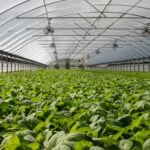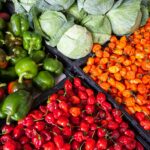What is Sustainable Food Production?
Sustainable food production refers to the method of cultivating and harvesting food in a manner that is environmentally conscious and economically viable over the long term. It encompasses practices that minimize harm to the environment, conserve natural resources, and prioritize the well-being of future generations. By adopting sustainable food production methods, farmers aim to reduce their carbon footprint, preserve biodiversity, and mitigate the negative impacts of agriculture on ecosystems.
One of the key benefits of sustainable food production is the positive impact it has on the environment. By implementing eco-friendly farming practices such as organic farming, crop rotation, and water conservation techniques, sustainable food producers can help reduce pollution, soil erosion, and water contamination. This not only safeguards natural habitats and wildlife but also contributes to the overall health and resilience of ecosystems.
• Sustainable food production involves cultivating and harvesting food in an environmentally conscious manner
• It aims to minimize harm to the environment, conserve natural resources, and prioritize future generations’ well-being
• Farmers adopting sustainable methods aim to reduce their carbon footprint, preserve biodiversity, and mitigate negative impacts on ecosystems
• Eco-friendly practices such as organic farming, crop rotation, and water conservation help reduce pollution, soil erosion, and water contamination
• These practices safeguard natural habitats and wildlife while contributing to the overall health and resilience of ecosystems
Benefits for the Environment
Sustainable farming practices not only promote healthy eating habits but also have a positive impact on the environment. By utilizing methods such as crop rotation and natural pest management, sustainable farms reduce the need for harmful chemicals and pesticides, minimizing soil and water contamination. This, in turn, helps preserve biodiversity and protects natural ecosystems.
Furthermore, sustainable farming contributes to mitigating climate change by reducing greenhouse gas emissions through practices like cover cropping and reduced tillage. These methods help sequester carbon in the soil, acting as a natural carbon sink. Overall, the conservation of resources and promotion of biodiversity inherent in sustainable farming practices play a crucial role in ensuring a healthier environment for current and future generations.
How Sustainable Practices Improve Health
Supporting local and embracing sustainable food practices not only benefits the environment but also plays a vital role in enhancing public health. By choosing locally grown produce and supporting farmers who prioritize sustainable methods, individuals can access fresher, more nutrient-dense foods that are free from harmful chemicals. This conscious decision not only supports local economies but also contributes to the overall well-being of the community.
Additionally, the integration of green technology in sustainable food production further enhances the health benefits associated with consuming sustainably sourced foods. From reducing pesticide exposure to minimizing food waste through innovative storage and transportation methods, green technology plays a crucial role in ensuring that consumers have access to safe and nutritious food options. Embracing sustainable practices ultimately leads to a healthier population while also promoting a more resilient and environmentally conscious food system.
Case Studies of Sustainable Farms
In the realm of sustainable agriculture, several farms stand out as prime examples of innovative practices that prioritize environmental consciousness and long-term viability. These sustainable brands have not only managed to reduce their carbon footprint but have also paved the way for future trends in agricultural sustainability. By implementing cutting-edge technologies and forward-thinking strategies, these farms have successfully combined productivity with environmental stewardship.
One such farm harnesses the power of regenerative agriculture to restore soil health, increase biodiversity, and sequester carbon. Through the utilization of rotational grazing techniques and cover cropping, this farm has not only improved the quality of their products but has also contributed to the overall health of the ecosystem. As a pioneer in sustainable agriculture, this farm serves as a beacon of inspiration for others looking to adopt similar practices in the pursuit of a more sustainable future.
How to Support Sustainable Brands
To support sustainable brands, consumers play a crucial role in driving demand for products that prioritize eco-friendly practices. By actively choosing goods from companies that prioritize sustainability in their food production processes, individuals can contribute to a positive impact on the environment. This action not only encourages brands to continue implementing sustainable practices but also fosters a shift towards a more environmentally conscious market.
Consumers can also support sustainable brands by educating themselves on the various certifications that indicate a commitment to environmentally friendly practices in food production. Recognizing labels such as organic, fair trade, non-GMO, and Rainforest Alliance certified can guide consumers in making informed choices that align with their values of supporting sustainable practices. By understanding the significance of these certifications, individuals can confidently select products that promote a more sustainable approach to food production.
The Role of Technology in Sustainability
Advancements in technology have played a significant role in enhancing sustainability within the food production industry. Precision agriculture, for instance, utilizes various technologies such as drones, GPS, and sensors to optimize farming practices. These tools enable farmers to apply resources like water and fertilizers more efficiently, reducing waste and environmental impact while enhancing crop yields.
Furthermore, the use of biotechnology has revolutionized sustainable food production by creating genetically modified crops that are more resistant to pests, diseases, and extreme weather conditions. Through genetic engineering, scientists can develop crops with enhanced nutritional value and longer shelf lives, addressing challenges related to food security and waste. As technology continues to evolve, its integration into sustainable farming practices will play a crucial role in meeting the growing demands of a rapidly increasing global population.
Future Trends in Sustainable Food Production
One emerging trend in sustainable food production is the utilization of vertical farming systems. By growing crops indoors in stacked layers, this method maximizes space efficiency and minimizes the need for excessive water and pesticides. Vertical farming also allows for year-round production, reducing the reliance on seasonal crops and promoting a more stable food supply chain.
Another key trend on the horizon is the integration of blockchain technology to enhance traceability and transparency in the food supply chain. By recording each step of the production process on a secure digital ledger, consumers can easily track the origins of their food products and ensure they are produced using sustainable practices. This increased transparency not only builds trust between consumers and producers but also incentivizes farmers to adhere to higher sustainability standards.




